Now, you’ll notice that the 23rd and 25th are missing. Think driving. And then think a lot more about driving. From Mwanza to Nzali, from Nzali to Nairobi. But we don’t need to waste blog posts on driving, although we did meet every kind and wonderful Tanzanian police officer on the route. They wanted to know about our safety equipment, our battery covers, our insurance, our plates, and at times, they just wanted to know what we were thinking. So lovely. So many stops. But we digress.
From the Dodoma Hotel, we drove about 90 minutes to Nzali to record four groups:
Group 1: Makunga: This group is from Dodoma and the Wagogo Community, which they argued is the main indigenous community of Tanzania (always from the land, never migrated into Tanzania. The group was formed in 2018, but was built on a much older group. They perform in the Wuyina style.
Their instruments/costumes include the: Ndulele (Horn), the Nindo (Shakers), the Mbega: (Animal Skins), the Muheme (Drums), the Kabati (Shakers), the Kalimba (Thumb Piano), the Zeze (Orutu), the Izeze (5 string large instrument), and the Muhongwa (Wooden water troughs, played on ground like calabash, which was used in last song). The group started their performance with the most extraordinary set of customs – human shakers!
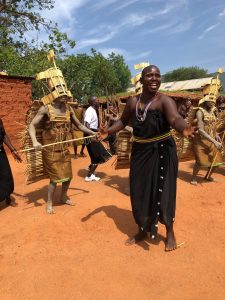
We recorded seven performances:
- Intro, Freestyle recording of their entrance.
- Masasi: the celebration song after circumcision completed
- Nindo: Song on social issues
- Muhene: Song during girl ceremony where she reaches puberty and now must be hidden from village for 40 days (song acts out how girl learns to reject the advances of men, represented by two men playing shakers)
- Muziki: A song to gain support of the people for the music and dance
- Muziki: Freestyle
- Muhongwa: another song from the circumcision ceremony, named after the instrument used (the wooden trough)
Group 2: Nyati Muchoya (also spelt Mchoya): From Nzali, the group is from the Wagogo Tupu community and was formed in 1966 by the grandfathers of the current performers.
Their instruments include: Nindo (jingles), Njuga (Shakers), Mbega (animal Skins), Muheme (drums), Kabati (kayamba-shakers), Manyanga ( Maracas), Madodolo (cow bell), and Pangwa/Kipangwa (a double headed lyre).
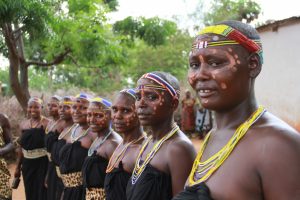
We recorded four performances, where each of the songs is named after the musical style:
- Nindo: A medley of songs including chimulombaje, muwalonjere and Nema Uganga, a song against witchcraft
- Muheme: a song urging all to get up and dance.
- Muziki:
- Msunyunsho: both songs showcasing musical styles of similar names and instruments.
Group 3: Ndagwa Msanga( a group comprising of young children): This group of young girls are from Msanga and the Wagogo community. The group was formed in 1994 to encourage the young of the Wagogo tribe to embrace and appreciate their culture.
Their style of music makes up all the musical styles of the Wagogo community. Their instruments are all about percussion: Ngoma (Drums) and Kayamba (Shakers). These young performers are amazing and if they are a sign, then the future of Tanzanian music is alive and well!
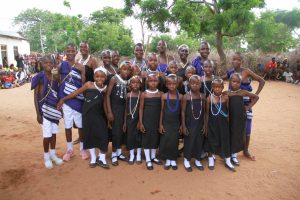
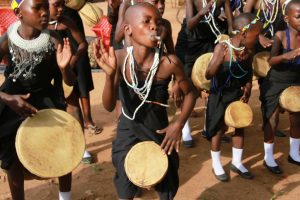
We recorded three performances:
- Tamasha la kumi: a song about ten principal rules on how to live a meaningful and productive life within society.
- Mapambano: a song against FGM and early girl child marriage.
- Vibibi Viwili: a warning song on alcohol and drug abuse.
Group Four: Hiari Ya Moyo: This group was formed in 1957 by their grandfathers and is located in Dodoma. They are from the Wanyamwezi Community and performed in the Ngoma Style.
Their instruments include: Ngoma (drums) and Njuga ( bells).
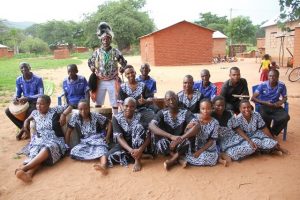
We recorded four performances:
- Muhala Wane: a love song
- Kauwowa Naye: a song urging the youth to be brave in facing the challenges in everyday life
- Mwanana: a song in praise of one’s friend.
- Lyuwa Laloka: it is sunset and time to conclude whatever business and return home to your family
And…that was it! Our last group. From there we drove…and drove…and drove…and ended up back in Nairobi. Some of us stayed for an important Singing Wells trip to Zanzibar. And the London crew sadly flew home.

